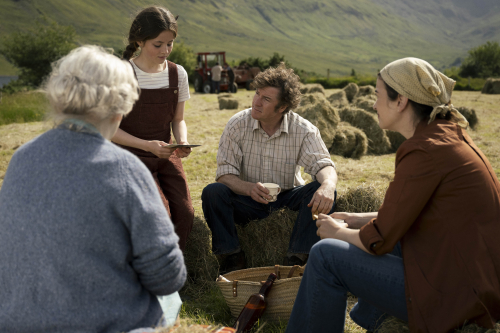
Martin Maguire
MOVIE REVIEW
That They May Face the Rising Sun (2024)
John McGahern is a titan of Irish literature who is perhaps less well known internationally. This is partially because his early books caused tremendous scandal – they dealt directly with violence against children, defiance of the Catholic church and the patriarchy, topics that Irish society was not prepared to face in the 1960s and 1970s. His last novel, “That They May Face the Rising Sun,” was a calmer book, published in 2002. It’s now been adapted into an excellent movie by Pat Collins, who cowrote the script with Eamon Little, and it stays true to the book’s calm heart while giving space for subtle character acting of the best kind.
Joe (Barry Ward) and Kate (Anna Bederke) Ruttledge have moved to the countryside for the quiet. Joe’s a writer who spends much time gazing out the window over his typewriter, while Kate’s an artist and the co-owner of a gallery in Dublin. Kate is also not Irish, and the Ruttledges are clearly gentrifiers, but as Joe also spent some of his childhood in the area nothing is directly said. It helps the Ruttledges keep an open house, offering cups of tea or bowls of soup to anyone who drops in. And as it’s a small town, of course people do. There’s Bill (Brendan Conroy), a sullen fella who believes in ritual and tradition; and Jamesie (Phillip Dolan), a cheerful gossip who’s married to Mary (Ruth McCabe) and who has a brother in London, Johnny (Sean McGinley). There are sheep to be worried about, hay to be harvested and a half-built greenhouse on which Joe has made no progress in two years. Kate has trouble with the gallery; and Joe has trouble with his new book. Their grumbles are discussed with the others in the same way as the farm work or the gossip, but for all the sociability, there’s a funeral which Joe is not told about until after the fact, because everyone knows he and Kate don’t go to mass. They are of the village, but they don’t quite truly belong.
There are very few children as most of the young people in the village have gone elsewhere for work, some to London; it’s a pleasing development that this was shown at the London Film Festival, which doesn’t normally give much support to Irish cinema. Perhaps things are changing, as things are changing in the village, where the residents are older, reliant on the buses or Joe offering lifts to get around. There’s even a surprise wedding between a couple in the autumn of their lives and a reception at which the whole area comes for the dance in the village hall. But as the time passes and the weather changes from sun to rain and back again, both Joe and Kate must start to decide whether their lives will be here, with these people, or if they’d rather go to a bigger place where their art might be more welcome, but harder to create.
It’s very ordinary, but then again nothing about daily life is ever ordinary, and the slow accretion of time as our lives come together – or not – is what in the end really matters. Cinematographer Richard Kendrick doesn’t make a big deal out of it, but the focus on life’s little things – sunlight on your face, a peaceful walk with a friend, a listening ear when one is needed – allows this movie time to breathe in a way unusual in modern cinema. The gallant striving of middle-aged men, whose best days are probably behind them, to keep moving forward and maintaining a positive outlook, is very nearly heartbreaking. The odds are against them, as they are against all of us. A cold house in the morning, boring chores and a hot supper, with a kind face to look at if we’re lucky, is all we have. It’s a movie about compromise and disappointment, and how the new day must be faced all the same. Mr. Collins’s great achievement here is that the slow realization that all our work and striving will end the same way as it does for everyone else is hopeful and poignant instead of despairing. Either way it’s not for kids.
Comments